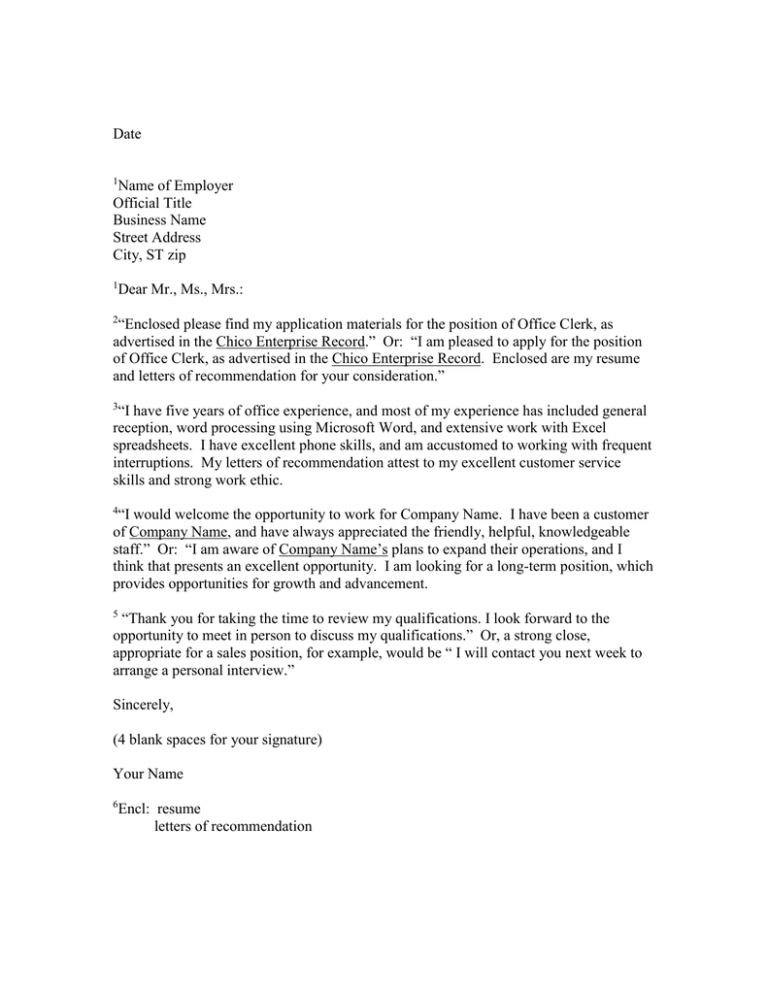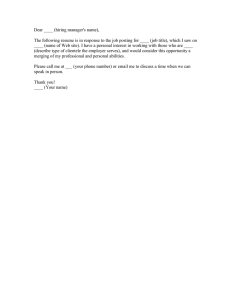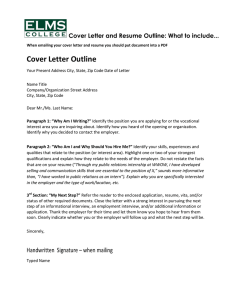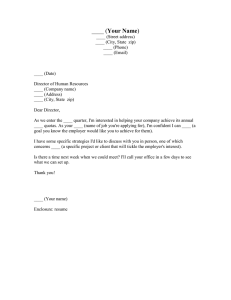Date Name of Employer Official Title
advertisement

Date 1 Name of Employer Official Title Business Name Street Address City, ST zip 1 Dear Mr., Ms., Mrs.: “Enclosed please find my application materials for the position of Office Clerk, as advertised in the Chico Enterprise Record.” Or: “I am pleased to apply for the position of Office Clerk, as advertised in the Chico Enterprise Record. Enclosed are my resume and letters of recommendation for your consideration.” 2 “I have five years of office experience, and most of my experience has included general reception, word processing using Microsoft Word, and extensive work with Excel spreadsheets. I have excellent phone skills, and am accustomed to working with frequent interruptions. My letters of recommendation attest to my excellent customer service skills and strong work ethic. 3 “I would welcome the opportunity to work for Company Name. I have been a customer of Company Name, and have always appreciated the friendly, helpful, knowledgeable staff.” Or: “I am aware of Company Name’s plans to expand their operations, and I think that presents an excellent opportunity. I am looking for a long-term position, which provides opportunities for growth and advancement. 4 “Thank you for taking the time to review my qualifications. I look forward to the opportunity to meet in person to discuss my qualifications.” Or, a strong close, appropriate for a sales position, for example, would be “ I will contact you next week to arrange a personal interview.” 5 Sincerely, (4 blank spaces for your signature) Your Name 6 Encl: resume letters of recommendation BEFORE YOU START The importance of doing some research, BEFORE you apply for the position, cannot be overstated! Most of the applications we receive look alike. The ones that stand out in our minds are those that have bothered to address our specific needs, and which express a sincere interest in working for us. You should call the employer prior to preparing your application materials, unless the ad says “no phone calls.” In order to focus on the employer’s needs you need to know the primary tasks you will perform, and essential skills for the position. This should also be a quick call, unless the employer asks you for more information. Other sources of information you can use are the Yellow Pages of the phone book, Internet websites, and news items from local or national publications. If the employer seems interested in you, by all means answer any questions they have. Let them take the lead, though; don’t offer a lot of unsolicited information. Remember, you called to “ask a couple of questions,” NOT to deliver a sales pitch for yourself. Frequently the person will invite you to send a resume. If this happens, see footnote #2, below. Here’s how a typical phone inquiry might sound: “My name is _________ and I am planning to apply for the position you have advertised, and I have a couple of questions about the position. Have you got a minute or two to answer a couple of questions? I’ve read the job description (or ad) and I’m wondering how the majority of my time would be spent in the position. What do you think are the most important skills for this position? Finally, to whom should I address my cover letter?” Confirm the individual’s title, spelling of name, and gender if applicable. (See footnote #1 below) “Thank you very much for your time!” FOOTNOTES 1. Confirm spelling of name, and gender, if necessary. “Kelly Smith” could be either a man or a woman, and “Kelly” could be spelled Kelly, Kelli, Kellie, etc. Even though “Smith” is a common name, confirm that it’s spelled in the usual manner, too. You may also want to find out if Kelly has a professional title, or if a woman, if Kelly prefers to be addressed as Miss, Mrs. or Ms. When in doubt, “Ms.” is considered a “safe” title for women. 2. In the first paragraph, tell the employer for which job you are applying, how you found out about the job, and point them to your application materials. If the employer has asked you to send a resume, (when you called for information) begin by stating that you are responding to their request. “As you requested when we spoke yesterday, enclosed are my application materials. . . . ” 3. In the second paragraph, highlight three or four things that qualify you for the position. This is done most effectively if you have called the employer ahead of time and asked them to identify the major duties, and skills required for the position. A job description will frequently list 10 or 20 duties, but most of your time will be spent on four or five tasks. Find out what those tasks are so you can focus this paragraph on your experience and/or skills related to those items. 4. The third paragraph, if you choose to use it, can describe additional skills, or you can focus on why you want to work for that employer. If you choose to “flatter” the employer, you need to be sincere and specific. Again, it’s most effective if you’ve contacted the employer before preparing your cover letter and resume. “From what you told me when we spoke on the phone, it sounds like your company is just the kind of place I’d like to work.” 5. The final paragraph should close with thanks and a request for action, or a statement of what action you will take. In a sales position, for example, an assertive close would be appropriate because a salesperson is expected to be assertive, and “ask for the sale.” In a large organization, “asking for the sale” is probably not going to help, and a more general close should be used. 6. “Encl.” stands for “enclosures” which should be listed, one per line. If the employer has provided you with an application, it should be listed as an enclosure, too. ADDITIONAL INFORMATION Ideally, your cover letter and resume should be customized for each position. Keep the letter to one page, and keep the paragraphs to five or six lines, or fewer. Center your letter vertically on the page by inserting blank lines at the top, if necessary. The cover letter and resume must be PERFECT with respect to grammar, spelling and punctuation. ALWAYS HAVE SOMEONE ELSE PROOFREAD YOUR MATERIALS BEFORE YOU SEND THEM! Print your resume and cover letter on matching, high-quality paper. Print your resume and cover letter in black ink on white or off-white paper.


